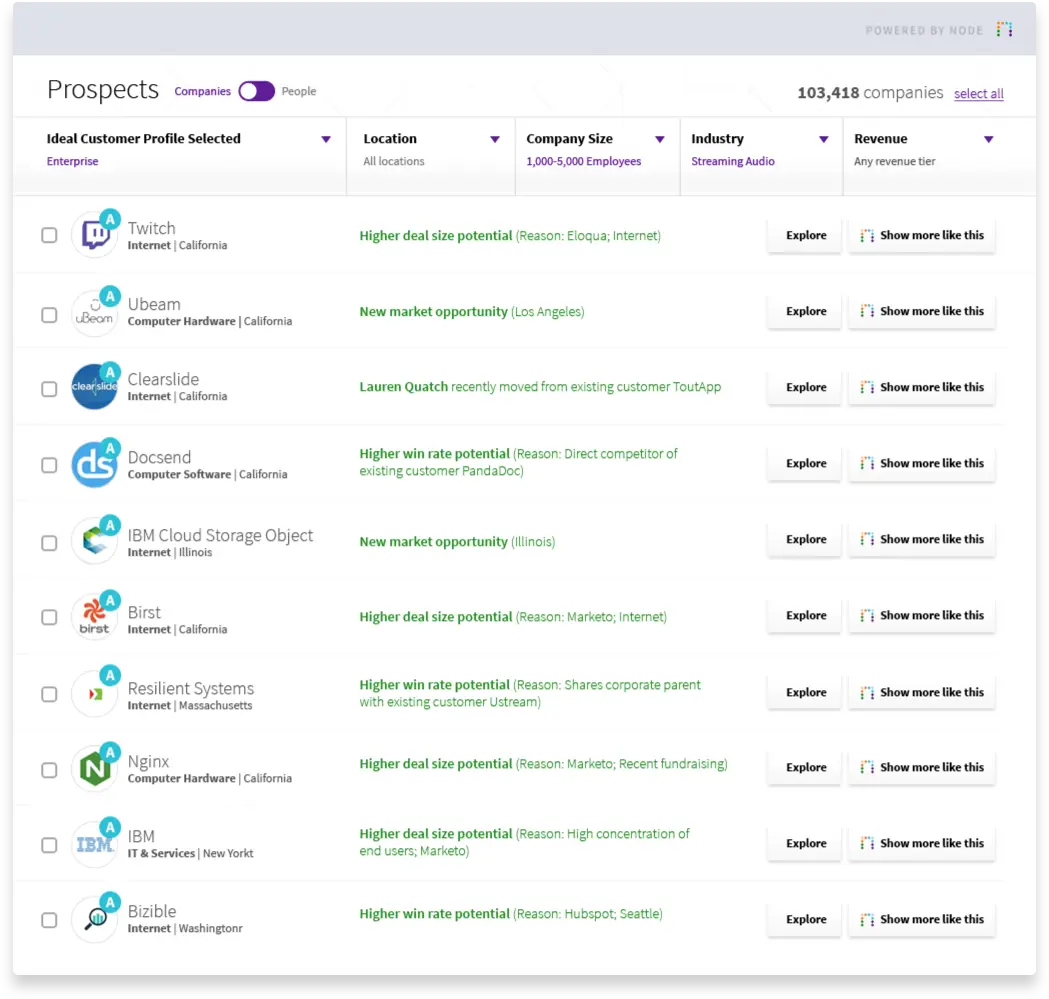Editor's Note: In August 2020, it was announced that Node was acquired by SugarCRM.
Node is an advanced artificial intelligence system that discovers and recommends new potential customers, then counsels marketers and salespeople on what to say to close more deals. And it has the backing of some serious tech minds, including renowned entrepreneur and investor Mark Cuban (@mcuban).
 Falon Fatemi (@falonfatemi), Node’s CEO and founder, was hired at Google when she was 19 and spent six years there focused on global expansion and strategic partnerships at YouTube. Node has $16.3 million in funding to date, including a $10.8M Series A round in July 2017, and is the “cold call killer”, according to Cuban. We sat down with Fatemi to learn how the solution has identified billions of dollars in market opportunities to date.
Falon Fatemi (@falonfatemi), Node’s CEO and founder, was hired at Google when she was 19 and spent six years there focused on global expansion and strategic partnerships at YouTube. Node has $16.3 million in funding to date, including a $10.8M Series A round in July 2017, and is the “cold call killer”, according to Cuban. We sat down with Fatemi to learn how the solution has identified billions of dollars in market opportunities to date.
In a single sentence or statement, describe Node.
Node uses advanced artificial intelligence technology to deliver marketing and sales teams a roadmap for market identification and revenue acceleration.
How does Node use artificial intelligence (i.e. machine learning, natural language generation, natural language processing, deep learning, etc.)?
Node is currently used by sales and marketing teams to instantly discover and proactively recommend new potential customers while also providing a roadmap of who to contact, what to say, and when to say it to close more deals.
Node is able to do that through proprietary artificial intelligence technology that mines the connections between people, companies, products, and places on the web. Using machine learning, Node sifts through these connections to discern context and uses AI to signal match them.
Next, Node uses natural language processing to analyze the core attributes of a customer’s target buyer and deep learning to proactively deliver relevant people and company intelligence.
Finally, the results from Node insights are fed back into AI algorithms to facilitate constant learning and continually improve recommendations as companies and people change.
What do you see as the limitations of artificial intelligence as it exists today?
There are three fundamental limitations of AI today.
First, most AI solutions require 18 months of historical data. This requirement inhibits many companies (especially early stage companies and companies without large-scale databases) from effectively using AI. Second, most AI solutions rely primarily on firmographic data and fail to account for the people-based intelligence and relationship data that are critical to provide salespeople and marketers with personalized recommendations. Third, most AI solutions fail to provide context. They operate according to a black box model and do not provide insight as to why the AI model generated specific results.
We’ve been able to overcome those three limitations with Node.
What do you see as the future potential of artificial intelligence in marketing and sales?
At Node, we believe that the future potential of AI is prescriptive rather than predictive intelligence. There are two fundamental limitations of predictive AI sales and marketing solutions.
First, they require that a customer’s CRM database already contains the “right” target people and companies. Second, they falsely assume that all customers are optimal and don’t change over time. They rely on lookalike modeling and prioritize prospects based on similarity to a company’s existing base. As a result, they are limited in their ability to discover the next areas of opportunity.
Prescriptive intelligence, on the other hand, is a dynamic model that relies on real-time data rather than static data points. It is people-centric and relationship-driven and incorporates individual preferences, emotions, and relationships to understand the connections between people, companies, technologies, and more. Most importantly, prescriptive intelligence doesn’t just divulge insights and prioritization scores in a black box, but rather helps sales and marketing people understand why specific results have been generated.
What makes Node different than competing or traditional solutions?
Node’s greatest differentiator is its ability to recommend a business’ next areas of opportunity without requiring 18 months of historical data. Even if a customer doesn’t have a single customer in a particular industry, sector, or location, Node can identify prospects with high likely buying propensities. Additionally, unlike traditional solutions, Node also explains all of its results (for example, why a given prospect has been assigned a particular score).
Who are your prototype customers in terms of company size and industries?
Node targets primarily US-based companies who have at least 50 employees and a sales/marketing team of at least 10 individuals. Node works with sales and marketing leaders with the following characteristics:
- Strategic operators who want to gain an edge on their competition.
- Executive decision-makers trying to plan for the future.
- Forward-thinking sales and marketing professionals seeking to identify new markets.
- Fast-growing companies tackling massive market opportunities.
What are the primary use cases of Node for marketers and sales professionals?
Node acts as the intelligence layer for sales and marketing, driving the following use cases.
Sales:
- Selection: Node helps sales reps focus on optimal accounts and contacts per segment.
- Prioritization: Node enables sales reps to prioritize outbound efforts based on the right accounts.
- Personalization: Node gives sales reps critical insights to personalize messaging and increase conversion.
Marketing:
- Selection: Node helps marketers identify target customers across marketing channels.
- Personalization: Node gives marketers insights to prioritize and personalize messaging, increase MQL to SQL conversion, and optimize opportunity creation.
- Campaign generation: Node helps marketers map out their total addressable market (TAM) and generate ad-hoc campaigns based on these TAM accounts.
Any other thoughts on AI in marketing, or advice for marketers who are just starting to explore the possibilities of AI?
At Node, we believe that the winners of the future will know more than their competition about the people they do business with. We can’t underestimate the immense role of interpersonal relationships in customer interactions. In order to effectively forge the relationships necessary to accelerate sales and increase client retention, we must account for individual preferences, emotions, and relationships.
When developing an AI strategy, don’t underestimate or lose sight of the value of people-based intelligence. People-based intelligence empowers salespeople and marketers to connect with prospects in genuine, meaningful, and scalable ways.
Paul Roetzer
Paul Roetzer is founder and CEO of Marketing AI Institute. He is the author of Marketing Artificial Intelligence (Matt Holt Books, 2022) The Marketing Performance Blueprint (Wiley, 2014) and The Marketing Agency Blueprint (Wiley, 2012); and creator of the Marketing AI Conference (MAICON).



